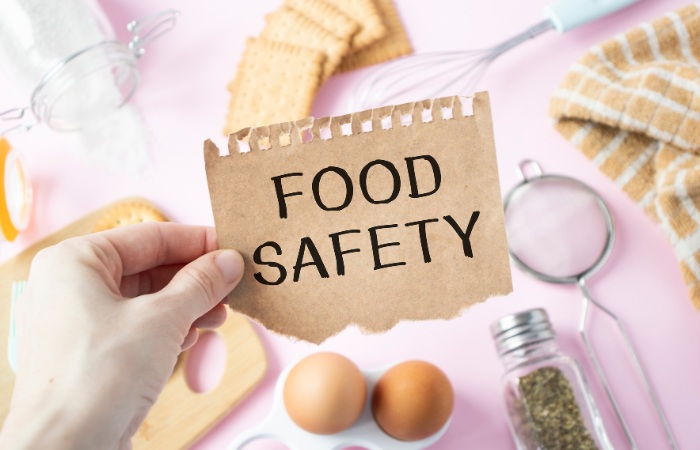Why Is Food Safety Important In Health And Social Care?

When it comes to health and social care, ensuring food safety is of utmost importance. The question is, why is food safety so critical in this field?
Food safety is important in health and social care because it helps prevent foodborne illnesses, promote healthy eating habits, reduce the risk of contamination, enhance the quality of care, and maintain trust and confidence in health and social care services.
In this blog, we will explore the significance of food safety in health and social care. We also discuss the potential risks associated with food contamination and best practices for ensuring the safety and quality of food.
How is Food Related to Health And Social Care?
Food plays a significant role in the health and social care sector. Food-related issues such as food poisoning, infections, and disease can directly impact the health of individuals, particularly care more vulnerable home residents.
Therefore, personal hygiene, food safety management systems, and legal requirements are crucial for ensuring the safety of hot and frozen foods and preventing the spread of harmful bacteria and germs.
Proper cleaning procedures, such as routine and deep cleaning, are essential for maintaining a safe and hygienic kitchen environment. Kitchen staff and food handlers must adhere to strict hygiene practices to prevent contamination and maintain the quality of the food chain.
Why Is Food Safety Important In Health And Social Care?
Food safety is critical in healthcare and social care for different reasons. Here we’ve discussed some significant reasons for food safety in health and social care.
Preventing Foodborne Illnesses
Preventing foodborne illnesses is crucial to food safety in health and social care. Foodborne diseases are caused by consuming contaminated food, leading to severe health complications and even death.
In a care home setting, residents may have weakened immune systems, making them more susceptible to infections. As such, care home staff must adhere to strict food safety guidelines to prevent foodborne illnesses.
Promoting Healthy Eating Habits
Healthcare and social care providers are responsible for promoting healthy eating habits to their clients. This involves ensuring that the food they serve is nutritious, well-balanced, and free from harmful bacteria.
By providing healthy meals, healthcare providers can help their clients maintain good health and prevent the development of diet-related diseases such as obesity, diabetes, and heart disease.
Reducing the Risk of Contamination
Contamination is a significant food safety hazard that can lead to the spread of harmful bacteria and other pathogens. In a healthcare or social care setting, contamination can occur at various stages of the food chain, from preparation to storage and serving. Care home staff must, therefore, be trained on the proper handling, storage, and preparation of food to reduce the risk of contamination.
Enhancing Quality of Care
The quality of care provided in healthcare and social care settings is heavily influenced by the food served to clients. Good food can improve the mood and well-being of clients, leading to a better overall quality of care.
In contrast, poor-quality food can have the opposite effect, causing client discomfort, sickness, and dissatisfaction. Thus, ensuring food safety is crucial to enhancing the care quality provided in health and social care settings.
Maintaining Trust and Confidence in Health and Social Care Services
Maintaining trust and confidence in health and social care services is essential for building and maintaining positive relationships with clients. Food safety plays a critical role in this regard, as clients need to trust that the food they consume is safe and free from harmful contaminants.
Failure to ensure food safety can lead to losing trust and confidence in the healthcare or social care provider, damaging their reputation and potentially leading to legal action.
Risks Associated with Food Contamination
Food contamination is a major public health concern that can cause foodborne diseases. There are several types of food contamination, each with its risks and consequences.
- Biological Contamination: Biological contamination is one of the most common food-related risks. Harmful bacteria, viruses, and parasites can contaminate food and cause illnesses such as food poisoning.
- Chemical Contamination: Chemical contamination can occur when food comes into contact with harmful substances such as cleaning products, pesticides, or heavy metals. This type of contamination can cause acute or chronic health problems depending on the type and amount of chemicals involved.
- Physical Contamination: Food can be contaminated by foreign objects such as glass fragments, metal fragments, or hair. It can cause injury or choking if ingested.
- Allergen Contamination: Allergen contamination can occur when a food product contains an allergen that is not listed on the label or comes into contact with an allergen during processing. It can cause severe allergic reactions in people with allergies.
- Radiological Contamination: When food is exposed to radioactive materials, it can become contaminated with radioactive materials. This is a rare risk associated with food but can have serious health consequences.
Best Practices for Ensuring Food Safety in Health and Social Care
Various measures need to be taken to ensure that food served in these settings is safe. Here we will discuss best practices for ensuring food safety in health and social care.
1. Establishing Food Safety Policies
Ensuring food safety is crucial in health and social care environments. Establishing food safety policies is the first step in this process. Food safety policies should cover all aspects of food handling, from sourcing ingredients to serving the final product. The policies should be designed to minimize the risk of food poisoning and other foodborne illnesses. The policies should also be reviewed and updated regularly to remain effective.
2. Adhering to Hygiene Regulations
Adhering to hygiene regulations is a key aspect of ensuring food safety. Kitchen staff should be trained to follow strict hygiene practices, including washing their hands frequently, wearing appropriate clothing, and using suitable cleaning products. All surfaces, utensils, and equipment should be cleaned and sanitized regularly. The kitchen environment should also be kept clean and free from pests.
3. Monitoring Temperatures
Monitoring temperatures is essential to prevent the growth of harmful bacteria in food. All cooked and hot foods should be kept above 63 °C, and all cold foods should be kept below 8 °C. Food handlers should use thermometers to check the temperature of food regularly. Food left at room temperature for over two hours should be discarded.
4. Preventing Cross-Contamination
Preventing cross-contamination is crucial in a kitchen environment. Food handlers should use separate chopping boards and utensils for raw and cooked foods. They should also avoid using the same utensils for different foods without washing them first. All food should be stored appropriately, and any food past its use-by date should be discarded.
5. Protecting Food from Contamination
Protecting food from contamination is also vital. Food should be stored in sealed containers and kept away from potential contamination sources. Raw foods should be stored separately from cooked foods to prevent the spread of germs. Frozen food should be defrosted in a refrigerator rather than at room temperature. Kitchen staff should also ensure that any food they serve is cooked thoroughly to kill harmful bacteria.
Read More:
15 Unhealthy foods for kids that should avoid
What Is A Food Label And Why Is It Important?
Final Thoughts
So, it is clear: why is food safety important in health and social care? Ensuring that food is stored, handled, and prepared correctly, reduces the risk of bacteria, viruses, and other infectious agents, which can lead to foodborne illnesses.
In turn, this has a positive effect on the health of those receiving care, as well as those providing it, helping to promote the well-being of everyone involved. Furthermore, food safety also has an important role in protecting social care providers’ reputations, as any food safety issues could harm their reputation.




